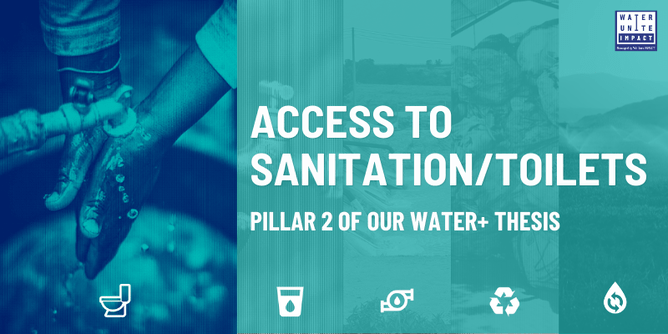This October we’re concluding our Water+ series by highlighting Pillar 2 of our water+ thesis: Access to Sanitation/Toilets. Access to sanitation is one of the most basic human needs. The right to sanitation ensures that everyone has both physical and affordable access to facilities that are safe, hygienic, secure, and preserve privacy and dignity.
However, due to a range of barriers, around 40% of the world’s population do not have access to safely managed sanitation facilities. Over 1.5 billion people do not have even basic sanitation services such as private toilets or latrines. Of these, 419 million still defecate in the open, such as in the street gutter, behind bushes or into open bodies of water.
This is a pervasive health risk with devastating consequences. Unsafe sanitation is responsible for 1.4 million deaths a year, making it one of the leading causes of deaths globally. Poor sanitation is linked to the transmission of diarrheal diseases like cholera and dysentery, as well as typhoid, intestinal worm infections, and polio. Poor sanitation exacerbates malnutrition by creating an environment where infectious diseases thrive, impairing nutrient absorption and weakening the immune system. Additionally, repeated exposure to pathogens due to poor hygiene and contaminated environments drives the misuse and overuse of antibiotics, accelerating the spread of antimicrobial resistance.
Furthermore, poor access to sanitation has further far reaching consequences. It reduces human well-being and social and economic development, while raising the risk of sexual assault, and intensifying lost opportunities for education and work. This disproportionately affect women and children, with women facing a higher risk of sexual violence due to unsafe sanitation facilities, and both women and children more likely to experience limited access to education and work opportunities. Stark disparities persist between urban and rural areas, and between wealthy and poor communities.
The sanitation situation in cities, particularly in densely populated, low-income, and informal areas, is becoming increasingly challenging for a number of reasons. Sewage is either unstable or non-existent, toilet space is limited, poorly designed pits and septic tanks pollute open drains and groundwater, and faecal sludge removal services are unavailable or unaffordable. This exacerbates inequalities because sewage is discharged into storm drains and waterways, polluting lower-income areas of cities. The effects of climate change, such as flooding, water scarcity, droughts, and rising sea levels, are only worsening these issues and delaying improvements to sanitation for billions of people who continue to live without access to toilets/sanitation.
Poor sanitation has significant and harmful effects on the environment, contributing to multiple ecological problems. Improperly managed waste, particularly through open defecation and inadequate sanitation systems, releases greenhouse gases like methane, which exacerbate climate change. Additionally, contaminated water from unsanitary conditions can pollute rivers, lakes, and groundwater sources, rendering them unsafe for drinking, agricultural use, and aquatic life. Soil contamination occurs when human waste is improperly disposed of, introducing harmful pathogens that degrade soil quality, affect plant growth, and make the land unsuitable for farming. Air pollution is another consequence, as waste left in the open releases harmful gases that contribute to respiratory health issues and degrade air quality.
Open defecation further impacts the environment by turning land and water sources into de facto sewers, polluting ecosystems and harming wildlife. Improving waste management not only enhances local environments by reducing litter in streets and near disposal sites, but it also has broader benefits at national and global levels. Efficient sanitation systems help protect ecosystems, reduce pollution, and contribute to the fight against climate change, creating a healthier environment for both people and nature.
Our investees, Sanivation, simultaneously solve both sanitation and environmental issues. Based in Kenya, Sanivation works to address poor waste management and develop an environmentally-friendly fuel alternative to charcoal and wood. They also develop, build, and operate circular economy treatment plants that process sludge from pit latrines and septic tanks. This waste is treated and combined with other waste products like sawdust to form briquettes providing a low-carbon bioenergy alternative to fossil fuels whilst reducing methane emissions.
Ground breaking organisations and businesses such as Sanivation, who are developing and implementing innovative community based solutions to issues such as sanitation, are fundamental to the Water Unite approach and offer hope for significant improvements in the access to sanitation in the developing world.

